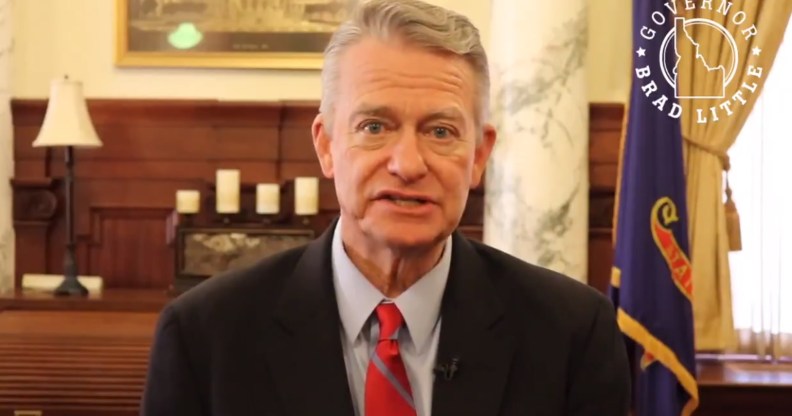Republican governor just signed two of the most horrifically transphobic bills in American history into law

Republican governor Brad Little’s bill focusing on attacking trans people has been suspended.
In the midst of a global pandemic, Republican Idaho governor Brad Little has effectively declared open season on trans people in his state.
On Monday, Little signed two laws that campaigners say effectively make trans people second-class citizens by restricting their basic rights.
Idaho governor signs horrific anti-trans laws.
The first, HB509, bans transgender people from changing the gender on their birth certificates, flouting a previous a federal court ruling on the issue.
It asserts that the state will prohibit any changes to gender markers and only recognise a so-called “biology-based definition of sex,” based on “immutable biological and physiological characteristics, specifically the chromosomes and internal and external reproductive anatomy”.
The second bill, HB500, bans schools and colleges from letting transgender girls from taking part in girls’ sports.
Under the horrific law, girls whose sex is “disputed” will be required to show medical evidence of their “internal and external reproductive anatomy” – while pupils who believe they have been “disadvantaged” by their transgender classmates will be able to sue their schools for “injunctive relief, damages, and any other relief available under law”.

Republican Idaho governor Brad Little is focusing on attacking trans people
There are already no discrimination protections for transgender people in the Republican-dominated state, with the two laws eroding their basic rights even further.
Idaho is in ‘open rebellion against rule of law’ by flouting federal ruling.
LGBT+ campaigners have already vowed legal action over the bills – signed one day before the Transgender Day of Visibility – which fly in the face of an explicit federal court ruling on gender recognition in the state issued just two years ago.
Lambda Legal counsel Peter Renn said that lawmakers in the state are “fully aware that they were explicitly flouting a binding federal court order”.
He added: “The court could not have been clearer: this policy was unconstitutional two years ago, and it is still unconstitutional today. Idaho has deliberately set itself on a collision course with the federal courts. It is in open rebellion against the rule of law.”
Alphonso David, president of the Human Rights Campaign, said: “We are living in an unprecedented global health crisis, with confirmed cases of COVID-19 increasing on a daily basis in Idaho, across the United States and around the world, but governor Brad Little and the Idaho legislature have decided to prioritise the demonisation of transgender people.
“This is unacceptable, and a gross misuse of taxpayer funds and trust. Idaho is leading the way in anti-transgender discrimination, and at a time when life is hard enough for everyone, Idaho’s elected leaders will be remembered for working to make their transgender residents’ lives even harder. Shame on Governor Little and the legislators who championed these heinous pieces of legislation.”
Sam Brinton of The Trevor Project said: “In the midst of a global pandemic, Idaho just became the first state in the nation to legally mandate discrimination against transgender student-athletes.
“By signing HB500 and HB509, governor Brad Little has pushed the transgender community of Idaho to the sidelines, further marginalising a group that is already at high risk for harassment, discrimination, and suicide.”
GLSEN executive director Eliza Byard said of HB500: “In the dark of night, and at a time when our entire nation is already in crisis, governor Little decided to discriminate against some of his state’ s most vulnerable students.
“We know 84 per cent of transgender students have experienced harassment or assault in their schools and nearly four out of five experience discriminatory school policies and practices. We know that nearly half of transgender students report having seriously considered committing suicide within the past year.
“Above all, we know that transgender students need stronger connections to their teachers, classmates and school communities – exactly the kind of connections that school athletics can provide.
“This law must not stand, because of the danger it poses to transgender students, and the harm it will do to any athlete whose gender is called into question by their peers.”

